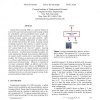Free Online Productivity Tools
i2Speak
i2Symbol
i2OCR
iTex2Img
iWeb2Print
iWeb2Shot
i2Type
iPdf2Split
iPdf2Merge
i2Bopomofo
i2Arabic
i2Style
i2Image
i2PDF
iLatex2Rtf
Sci2ools
102
click to vote
ICTAI
2009
IEEE
2009
IEEE
EBLearn: Open-Source Energy-Based Learning in C++
Energy-based learning (EBL) is a general framework to describe supervised and unsupervised training methods for probabilistic and non-probabilistic factor graphs. An energy-based model associates a scalar energy to con’¼ügurations of inputs, outputs, and latent variables. Inference consists in ’¼ünding con’¼ügurations of output and latent variables that minimize the energy. Learning consists in ’¼ünding parameters that minimize a suitable loss function so that the module produces lower energies for ŌĆ£correctŌĆØ outputs than for all ŌĆ£incorrectŌĆØ outputs. Learning machines can be constructed by assembling modules and loss functions. Gradient-based learning procedures are easily implemented through semi-automatic differentiation of complex models constructed by assembling prede’¼üned modules. We introduce an open-source and cross-platform C++ library called EBLearn1 to enable the construction of energy-based learning models. EBLearn is composed of two major components, libidx: an ef’...
Artificial Intelligence | Energy-based Learning | Energy-based Learning Models | ICTAI 2009 | Latent Variables |
| Added | 24 May 2010 |
| Updated | 24 May 2010 |
| Type | Conference |
| Year | 2009 |
| Where | ICTAI |
| Authors | Pierre Sermanet, Koray Kavukcuoglu, Yann LeCun |
Comments (0)

